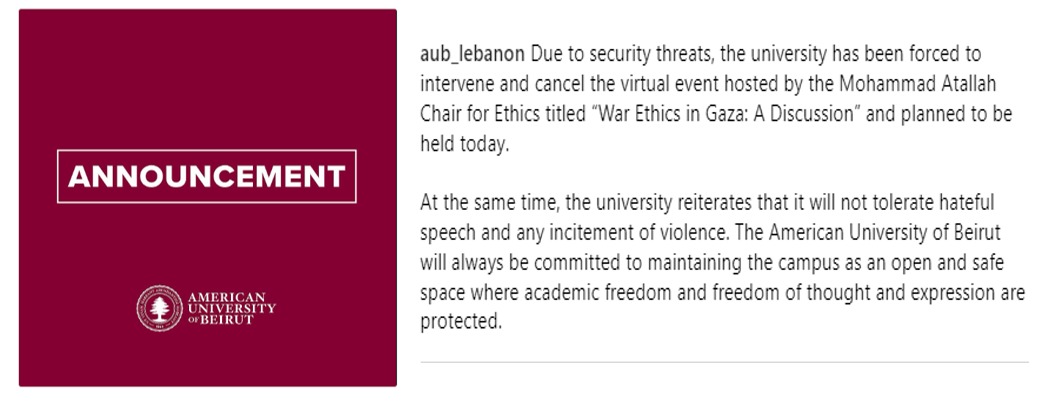
The American University of Beirut announced on Friday afternoon, November 11, the cancellation of a virtual lecture, entitled “The Ethics of War in Gaza,” featuring Alec Whalen, Professor of Law and Philosophy at Rutgers University in New Jersey, and Bashar Haider, Professor of Philosophy, American University of Beirut.
In its message to university members, the administration announced that “due to security threats, the university was forced to intervene and cancel the virtual event hosted by the Muhammad Atallah Chair in Ethics entitled “The Ethics of War in Gaza: A Discussion” and scheduled to be held today (Friday).” The university added at the conclusion of the letter, At the same time, the university affirms that it will not tolerate hate speech and any incitement to violence. The American University of Beirut will always be committed to maintaining the campus as an open and safe space where academic freedom and freedom of thought and expression are protected.”
In fact, what the university did in canceling the lecture, and despite its security justifications, remains a major moral failure that will go down in its history and will make one of oldest bastions of liberal thought in the East subject to the bullying of Hezbollah and the axis of resistance, which rejects dialogue and the language of reason and promotes the idea of perpetual wars, which serve Iran and its Iranian Revolutionary Guard Corps.
While some might claim that Hezbollah is not the source of these threats, the mere fact that the AUB administration took these threats seriously confirms their source, and the attack that the university was subjected to a month ago by members of Hezbollah and the destruction of some of its property is certainly not a mere coincidence.
The controversy and discussion that surrounded the announcement of the lecture included a violent reaction from some faculty members, some of whom made arguments – perhaps correct – in withdrawing the university’s invitation to Alec Whalen under the pretext of promoting Zionist thought and justifying the ongoing massacre in Gaza. This is, of course, misleading, not to say pure dishonest talk. It is based on fragmentary statements taken out of context in which a person’s recognition of the existence of the “state” of Israel and its right to defend itself makes him a supporter of the ongoing genocide against the civilians of Gaza under the pretext of uprooting the Hamas movement.
The exchange of faculty emails over the past two days, which usually takes place on a daily basis, involves various matters, including cats on the university campus or childish graffiti on the walls of the classrooms, but what emerged from this electronic exchange on the university campus on Friday in terms of student demonstrations stigmatizing the organizers as Zionists and calling for their death is a new low by people who claim they do not want to endorse US policy, while they are fully satisfied with benefiting from money and salaries that come to them from grants and programs linked to the West. Yet at the same time they refuse to allow a simple academic discussion to take place, and perhaps worse, some went as far as to coordinate with some totalitarian parties to carry out their dirty work and threaten the organizers with death.
It is interesting that some of those who objected to the lecture on the ethics of war and demanded its cancelation, were equally enraged by similar practices of western institutions and the fact that the Christie’s auction house removed two paintings by Lebanese artist Ayman Baalbaki from its London sale because they depicted what was perceived by some as signs of endorsing Hamas and the killing of Jews, and also the postponement Adania Shibli a Palestinian author award ceremony at the Frankfurt Book Fair. In this respect asking for the cancellation of the Whalen talk is nothing but intellectual hypocrisy and double standards.
It is perhaps permissible for some to reject the idea of the lecture, and it is acceptable for them to boycott it, but it is not acceptable for individuals outside the university to be mobilized and rallied to spill the blood of those who believe that the discussion about the ethics of war, which exposes Israel’s weak narrative, is more worthy than the chants that glorify “Mohammed Al-Deif, the military leader of Hamas, and the slogans of death to Israel.” Slogans which were chanted by some angry students in front of the main gate of the university and which I myself witnessed from the window of my office, and which made me think that the parents of these youth, some of whom support Hezbollah, are investing small fortunes to educate their children and provide them with analytical skills and certificates that will enable them to change the world around them, not to become megaphones for ridiculous projects that serve sectarian agenda.
The American University of Beirut, over the course of a century and a half of its existence, has been a beacon of reason and logic, but what happened during the past days of incitement, and mayhem and the leaking of the discussion on the faculty list which was fused into the hate speech on campus and the subsequent threats -something that was acknowledged by the administration – comes to remind us of one indispensable fact.
Both Zionism and the axis of resistance in its current manifestation share the same intellectual DNA, and while they refuse or perhaps shy away from intellectually confronting their opponents in politics and debate, the problem in Lebanon is not the economic and social collapse but rather that, the American University of Beirut, unfortunately, succumbed as did the majority of the Lebanese, to a group that considers constructive ambiguity and jihadi theatrics a path to liberation, while the gate of the American University is adorned with a phrase from the Holy Bible, “May they have life and have it more abundantly” but with what happened today, perhaps not.
The AUB administration in the bicentenary should rethink this phrase and use the motto of my late friend who was killed in southern Lebanon, Lokman Slim, “Zero Fear,” which guarantees the endurance of its humanitarian message and its ability to withstand the barbarians at its walls and – in the case of some – its classrooms.
Makram Rabah is the managing editor at Now Lebanon and an Assistant Professor at the American University of Beirut, Department of History. His book Conflict on Mount Lebanon: The Druze, the Maronites and Collective Memory (Edinburgh University Press) covers collective identities and the Lebanese Civil War. He tweets at @makramrabah







